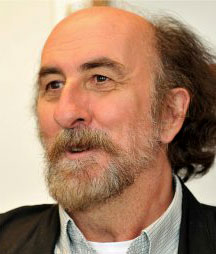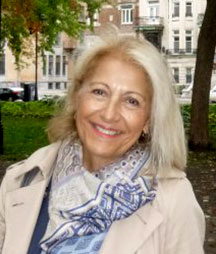CIG’s year-round staff in Athens include the Director, Assistant Director and Cultural Program Manager. They are assisted during the academic year (September to May) by a Fellow and Interns appointed annually, and by a summer Intern from May through July.
After completing his B.A. and M.A. in Classical archaeology at Université Laval (Quebec), Jacques Perreault undertook his doctoral studies at the École Pratique des Hautes Études en Sciences Sociales in Paris. He obtained his Ph.D. in archaeology in 1984 and that same year was admitted as the first Canadian member of the French School of Archaeology in Athens. In 1987 he was appointed Director of the Canadian Archaeological Institute in Athens. Returning to Quebec in 1992, he taught one year at Concordia University before being hired at the Université de Montréal in 1993 as Director of its Center for Classical Studies, a position he held until 2003. Since 2014 he has been Chair of the Université de Montréal’s History Department.
Jacques Perreault has taken part in several archaeological excavations in France, Tunisia, Syria and Greece. He is currently co-director of the Greek-Canadian Excavations at Ancient Argilos.
He has contributed to numerous publications. His main interests concern contacts between Greeks and non-Greeks, trade in the ancient Mediterranean, Greek colonization and urbanism, and various aspects of Greek productions, especially pottery. Jacques Perreault was appointed an honorary member of the Greek Archaeological Society in 1987 and named honorary citizen of the City of Amphipolis in 2010.
Jonathan Tomlinson received an honours degree in Chemistry (1988) and a PhD in archaeological science (1991), both from the University of Manchester. His research examines trade in the Late Bronze Age Eastern Mediterranean through the provenancing of pottery by chemical analysis. Jonathan first came to Greece in 1990 as a student at the British School at Athens, and returned in 1991 to work on the publication of results from his thesis. Several international scholarships allowed him to continue and expand his research and to conduct fieldwork at Knossos, Palaikastro and Kato Phana. He has continued to live in Greece since then, and became CIG’s Assistant Director in 1999.
Zoe Delibasis completed a BA in Sociology and Social Anthropology at McGill University in Montreal. She moved to Greece in 1979, having been selected for the position of Immigration Officer at the Canadian Embassy in Athens. In 1994, Zoe was designated Political and Public Affairs Officer at the Canadian Embassy in Athens, also responsible for cultural and media relations, a position she held until her retirement from the Canadian Public Service in 2020.
Zoe’s professional experience includes the organization of cultural events in the performing, visual and literary arts as well as cinema, including Canadian participation at the Thessaloniki International and Documentary Film festivals, the Athens Festival and the Thessaloniki Book Fair. She has led media promotion campaigns of Canadian embassy events and initiatives, including the North America tour of the exhibit “The Greeks: From Agamemnon to Alexander the Great”. She developed the annual Canadian Artist’s Residency program at the Vorres Museum in Athens, Greece. She has initiated bilateral collaboration between Canadian and Greek academic institutions for the establishment of partnerships in research and education.
Zoe has attended conferences and workshops in Canada and Europe on media relations, as well as on arts management and promotion. She has participated in international cultural events, including the CINARS Biennale and Le Salon du livre in Montreal, as well as the International Film Festivals of Montreal and Toronto.
She speaks, English, French, Greek and Italian.
Adam Wiznura is a PhD student in Ancient History at the University of Groningen, under the supervision of Prof. Dr. Onno van Nijf and Dr. Christina Williamson. His PhD project is entitled “Connecting the Greeks: Regional Festival Networks in Hellenistic and Roman Thessaly”.
Festivals of all types, including athletic and religious festivals, contribute to a sense of belonging and identity at a local level and are a way of creating connectivity at a regional level. This research posits that festivals and festival networks played a large part in the creation of a Thessalian regional identity. Festivals in Thessaly, during the Hellenistic and early Roman Periods, are of importance as they represent not only connectivity between peoples in Thessaly, but because of the erratic and uncertain nature of the period in Thessaly (invasions, forced population movements, increased foreign contacts, and political and religious reforms), the festivals are a good chronological indicator of how beliefs and customs were ever changing but could also stay the same. His research seeks to understand the roles of festivals in identity-formation processes during the Hellenistic period in Thessaly. It also attempts to answer the question of how festivals served to connect communities within the region as well as the wider Greek world, and the role of festivals in establishing a cohesive sense of regional identity.
Thanks to the Elisabeth Alföldi-Rosenbaum Fellowship, Adam hopes to complete the writing of his dissertation and do supplementary research further analysing the athletic culture in Thessaly during the Roman period, to which his nine-month stay in Greece is instrumental. He will not only be able to have access to a wide variety of publications in the Canadian Institute in Greece and other foreign institutes but will also be able to interact with scholars who share common research interests. Additional research trips through Thessaly will also aid in the contextualisation of festivals within the region.
Dante Campanella recently graduated with a bachelor’s degree in Archaeology and Heritage Studies from Wilfrid Laurier University. Dante is now a graduate student at Queen’s University studying Classical Archaeology with a special interest in the Eastern Mediterranean.
During his undergrad Dante participated in field training in Madaba, Jordan where he gained a better understanding of archaeology in the Eastern Mediterranean. Dante wishes to investigate further into the relationships between different peoples regarding trade and the economy in the classical period.
Exploring Greece will allow Dante to better understand the relationships between people and its impact on trade and the economy by looking at sites and artifacts which show this relationship.




